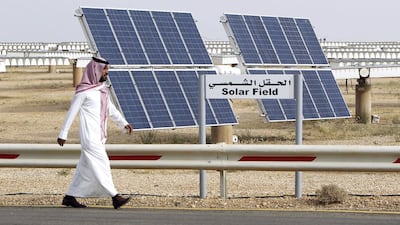Saudi Arabia, the world's largest exporter of oil, plans to add gas and renewables capacity equating to one million barrels of oil per day by 2030, according to the kingdom's Crown Prince Mohammed bin Salman.
The kingdom is looking to green its power mix and export more barrels of oil. It is also committing to lowering emissions and the energy impact of fossil fuels as part of its diversification strategy for 2030.
"We aim to have the share of each gas and renewable energy in this mix at 50 per cent by 2030,” Prince Mohammed Bin Salman said in comments reported by the Saudi Press Agency. Growth in the use of renewables and gas could replace about one billion barrels of oil per day used for electricity and water desalination, he added.
The Crown Prince was speaking at the signing of seven power purchase agreements for new solar photovoltaic plants in Saudi Arabia following the inauguration of the Sakaka plant.
The 300 megawatt Sakaka power plant is the kingdom's first-ever solar utility-scale project. It has been built at a cost of 1.2bn Saudi riyals ($320m) and is part of the kingdom's plan to add 27.3 gigawatts of clean energy to its grid by 2024.
Prince Mohammed also said the kingdom's first wind energy project, the 400MW Dumat Al Jandal farm, will be completed soon. The utility-scale wind project is being developed by France’s EDF and Abu Dhabi’s Masdar.
The kingdom plans to account for almost half of the region's wind capacity additions by 2028.
“The output capacity of these projects, in addition to the projects of Sakaka and Dumat Al Jandal, will amount to more than 3,600MW," Prince Mohammed said.
The projects will have the capacity to power more than 600,000 households and offset greenhouse gas emissions by more than 7 million tonnes, he added.
Among the power purchase agreements signed on Thursday, was a 3.4bn Saudi riyal contract for the 1.5 gigawatt Sudair solar PV plant.
The project, which is backed by the sovereign Public Investment Fund, will be built within Sudair Industrial City and will power 185,000 homes, offsetting 2.9 million tonnes of carbon dioxide.
It is being developed by two PIF-backed entities – Acwa Power and the Water and Electricity Holding Company, Badeel.
The PIF holds a 50 per cent stake in Acwa Power, one of the most prolific developers of conventional and renewable energy projects in the kingdom.
The consortium signed the 25-year power purchase agreement with the Saudi Power Procurement Company.
The project is set for commissioning in the second half of 2022 and will become the largest of its kind in the kingdom.
"The renewable energy sector is a critical sector that provides sustainable solutions against the challenges of climate change, through developing projects aimed at reducing carbon emissions," said PIF governor Yasir Al-Rumayyan.
The PIF has been given the mandate to develop nearly 70 per cent of renewable projects in Saudi Arabia. Utilities and renewables are among the 13 sectors identified by the fund as part of its Vision 2030 strategy.


